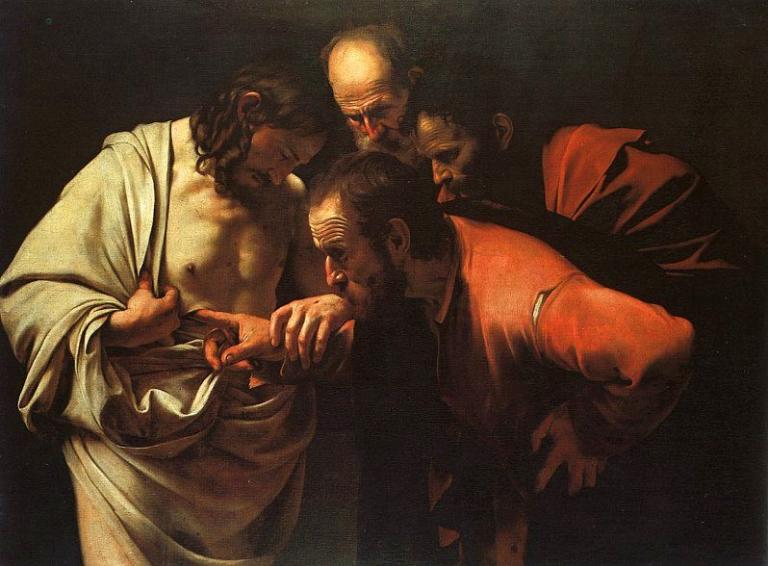
You’ve heard of the doubting Thomas? He’s the disciple who would not believe the testimony of his fellow apostles that Jesus had been raised bodily from the dead. He replied that he would only believe if he could place his finger and hand in the risen Jesus’ cruciform wounds. I really think his doubt was a form of devotion. Let’s consider Thomas’ relationship with Jesus more closely, beginning with the gospel account to which I just alluded:
Now Thomas, one of the twelve, called the Twin, was not with them when Jesus came. So the other disciples told him, “We have seen the Lord.” But he said to them, “Unless I see in his hands the mark of the nails, and place my finger into the mark of the nails, and place my hand into his side, I will never believe” (John 20:24-25; ESV).
Later Jesus appeared to Thomas in the presence of the other apostles and encouraged Thomas to do exactly what Thomas had told the other disciples he must do if he were to believe that Jesus was indeed alive:
Eight days later, his disciples were inside again, and Thomas was with them. Although the doors were locked, Jesus came and stood among them and said, “Peace be with you.” Then he said to Thomas, “Put your finger here, and see my hands; and put out your hand, and place it in my side. Do not disbelieve, but believe.” Thomas answered him, “My Lord and my God!” Jesus said to him, “Have you believed because you have seen me? Blessed are those who have not seen and yet have believed.” (John 20:26-29; ESV).
Notice that Jesus did not rebuff Thomas on account of his doubt by telling him to believe only with the heart or with his naked eyes. Jesus engaged Thomas where he was at, so to speak. In Caravaggio’s painting of the encounter, which is visible above in this post, Jesus went so far as to take Thomas by the hand and place the hand in his side. While it is certainly true that the text records Jesus as saying that those who believe without seeing him are blessed, Jesus’ statement does not come across to me as a rebuke of Thomas. Rather, it is at this point that John’s Gospel turns to those readers, who have never had visible access to Jesus (which includes us) and calls them blessed for simply believing the testimony of faithful witnesses concerning his bodily resurrection. Again, if Caravaggio’s painting provides any indication of Jesus’ intended remarks, it would be that the Lord welcomed Thomas’ genuine, honest, and open inquiry.
Remember, too, how devoted Thomas was to Jesus in his discipleship: when he realized Jesus had determined to go up to the vicinity of Jerusalem at a time when his life was at risk there, Thomas urged his fellow disciples to go up with him and die with the Lord. (John 11:16; ESV). Going further, it is not certain how Thomas died. One report indicates that he traveled as far as India and founded the church there. The report indicates that he died when pierced with the spears of four soldiers. While it is not certain how Thomas died, it does appear certain how he lived, according to John’s Gospel—as devoted to Jesus. He would rather have been the doubting Thomas than the gullible Thomas. He did not want to believe in an apparition or a figment of the imagination. Too much was at stake—the real Jesus and faithful witness to the Lord that would lead to his death.
Like C.S. Lewis many centuries later, Thomas was not after convenient or comfortable faith, but honest and true faith. Regarding costly faith, Lewis wrote in God in the Dock:
I have an elderly acquaintance of about eighty, who has lived a life of unbroken selfishness and admiration from the earliest years, and is, more or less, I regret to say, one of the happiest men I know. From the moral point of view, it is very difficult! I am not approaching the question from that angle. As you perhaps know, I haven’t always been a Christian. I didn’t go to religion to make me happy. I always knew a bottle of Port would do that. If you want a religion to make you feel really comfortable, I certainly don’t recommend Christianity.
It is far better to doubt than to engage in easy believism, where ignorance is bliss. Thomas was no cynic. But he was not a silly, drunken fool either. He desired sufficient reason to believe, and Jesus welcomed his search. He will welcome our genuine quest as well. As former atheist now Christian Dr. Sarah Irving-Stonebraker of Western Sydney University wrote in an article for The Veritas Forum,
Christianity, it turned out, looked nothing like the caricature I once held. I found the story of Jacob wrestling with God especially compelling: God wants anything but the unthinking faith I had once assumed characterized Christianity. God wants us to wrestle with Him; to struggle through doubt and faith, sorrow and hope.
While the Lord may not appear in person to take away any doubt you and I may have about him, I do believe he will reveal himself uniquely to those who really seek after him with genuine questions on their minds and in their hearts, like the devoted Thomas. As in the case of Thomas, those who want to remove all doubt from their faith are truly devoted.












